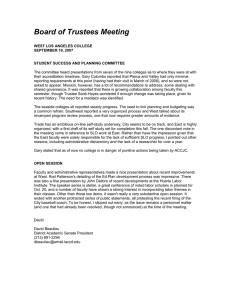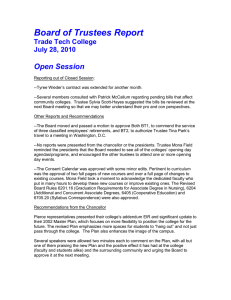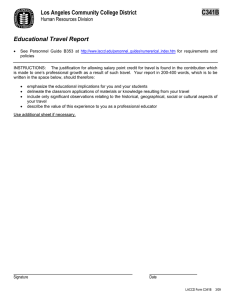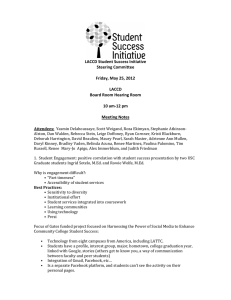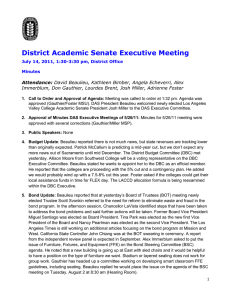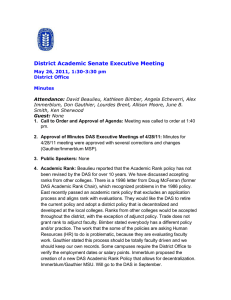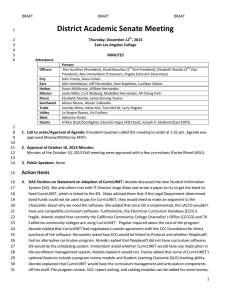District Academic Senate Executive Meeting
advertisement
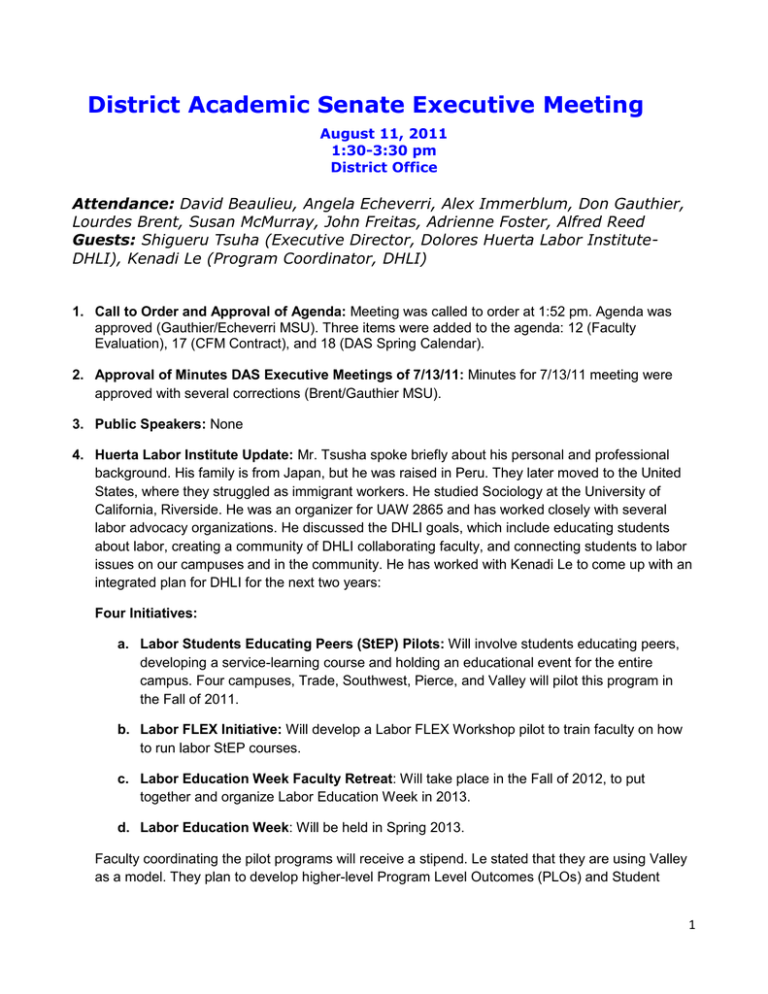
District Academic Senate Executive Meeting August 11, 2011 1:30-3:30 pm District Office Attendance: David Beaulieu, Angela Echeverri, Alex Immerblum, Don Gauthier, Lourdes Brent, Susan McMurray, John Freitas, Adrienne Foster, Alfred Reed Guests: Shigueru Tsuha (Executive Director, Dolores Huerta Labor InstituteDHLI), Kenadi Le (Program Coordinator, DHLI) 1. Call to Order and Approval of Agenda: Meeting was called to order at 1:52 pm. Agenda was approved (Gauthier/Echeverri MSU). Three items were added to the agenda: 12 (Faculty Evaluation), 17 (CFM Contract), and 18 (DAS Spring Calendar). 2. Approval of Minutes DAS Executive Meetings of 7/13/11: Minutes for 7/13/11 meeting were approved with several corrections (Brent/Gauthier MSU). 3. Public Speakers: None 4. Huerta Labor Institute Update: Mr. Tsusha spoke briefly about his personal and professional background. His family is from Japan, but he was raised in Peru. They later moved to the United States, where they struggled as immigrant workers. He studied Sociology at the University of California, Riverside. He was an organizer for UAW 2865 and has worked closely with several labor advocacy organizations. He discussed the DHLI goals, which include educating students about labor, creating a community of DHLI collaborating faculty, and connecting students to labor issues on our campuses and in the community. He has worked with Kenadi Le to come up with an integrated plan for DHLI for the next two years: Four Initiatives: a. Labor Students Educating Peers (StEP) Pilots: Will involve students educating peers, developing a service-learning course and holding an educational event for the entire campus. Four campuses, Trade, Southwest, Pierce, and Valley will pilot this program in the Fall of 2011. b. Labor FLEX Initiative: Will develop a Labor FLEX Workshop pilot to train faculty on how to run labor StEP courses. c. Labor Education Week Faculty Retreat: Will take place in the Fall of 2012, to put together and organize Labor Education Week in 2013. d. Labor Education Week: Will be held in Spring 2013. Faculty coordinating the pilot programs will receive a stipend. Le stated that they are using Valley as a model. They plan to develop higher-level Program Level Outcomes (PLOs) and Student 1 Learning Outcomes (SLOs). McMurray stated that community service should be tied into the course curriculum. 5. Budget Update: Beaulieu distributed a handout titled “Budget Forecast Scenarios” dated 8/10/11. He reported that Scott Lay feels that a mid year cut is almost certain. We may be facing a total cut of 8.5% in the worst-case scenario. We have $11 million unallocated in our balance. Everything else belongs to East, Pierce, or is an open order or otherwise accounted for. This reserve would be depleted by a mid-year cut. We have a very different Board with two new members who will probably be much more proactive in handling the fiscal crisis. The DBC Executive Committee is continuing to meet regularly; they are reviewing the LACCD allocation model. With SB 361, the new state allocation model is based on FTES. Under the SB 361 allocation model colleges get a baseline allocation depending on their size: small ($ 3 million), medium ($3.5 million), and large ($4 million). The LACCD added $0.5 M to the allocation of the four smaller colleges in January 2007. Later Trade was given another $0.5 M due to their high cost programs. Other colleges have unique issues. Southwest is located over two fault lines, and they have a very high electrical bill. 6. Office of the Controller: John Chiang from the California State Controller’s Office released the results of the LACCD Bond audit yesterday (8/10/11). Gauthier listed the major findings of the report: a. The LACCD inappropriately used $42.64 million in Measure J funds outside of the measure’s approved project list. b. The LACCD did not provide adequate oversight of the spending practices of its colleges, and the decentralized administration of the bond funds led to $28.3 million being spent on projects that were cancelled before completion. c. After spending $86 million in bond, state, and federal funds to develop a satellite campus at the Van de Kamp site, the Los Angeles City College determined that it had insufficient funds to operate the site and returned it to the LACCD. d. The LACCD citizen oversight committees were passive, perfunctory, and ineffective. e. When establishing an Inspector General for bond funding, the district ignored its own procurement rules and-at least in appearance-compromised the integrity of the position. The Board has called a special meeting for Wednesday August 17, 2011 to address the audit findings. 7. Districtwide Enrollment/Priority Enrollment: Beaulieu distributed a handout with enrollment by student’s primary college for Summer 2009-11, Fall 2010, and Spring 2011. Jeremy Allred from East had suggested that a significant problem was occurring there because a great number of their students were being displaced by those from other colleges. 2 TABLE 1. ENROLLMENT BY STUDENT’S PRIMARY COLLEGE Student Headcount Primary Summer Enrollment Other college 2009 678 4.8% 8116 No primary college 5194 East At this college All 2010 1810 12.4% 58.0% 8249 59.6% 8751 60.0% 37.1% 4242 30.6% 4026 27.6% 13998 100% 1358 9.8% 2011 13849 100% 14587 100% Beaulieu pointed out that 1810 students from other colleges were taking classes at East in the Summer of 2011. Another 4026 other students identified as having no primary college enrolled this summer at East; this includes freshmen, CSU, concurrent enrollment, and students from other districts. Finally, only 8751 out of 14587 students (60%) enrolled this summer have primary enrollment at East. Immerblum stated this practice is equivalent to other students bumping East students. He argued that the DAS has the responsibility to reopen the discussion on priority enrollment because this impairs the college’s ability to manage enrollment. He added that the Board insisted on and dictated decentralization several years ago without fully weighing the consequences. East asked if it could opt out of the district-wide enrollment process. There is some disagreement as to whether it is feasible to change it back. Victor Flores from IT replied that he is only allowed to program to policy. Immerblum argued this is a dictated mandate and not a well established policy. Beaulieu recapped history; five or six years ago the DAS had a consultation with former Chancellor Young and agreed on district-wide enrollment (just a common application at that point). A second phase was the common schedule alignment. Then in January of 2011, a third phase (district-wide enrollment option) was instituted. The deans of admissions approved this last change in the summer of 2010. There was no consultation on this last change. In terms of the technical issue, Mata said he was almost certain it was feasible to undo this or for a college to opt out either the entire year or the summer/winter. Reed said that many students from other colleges would not be able to graduate unless they went to East to get the classes they need. Gauthier stated that the solution would be for all colleges to offer classes in the summer so students can get their classes. Echeverri pointed out that the negative impact of eliminating summer sessions was brought up last year during consultation with the chancellor. Immerblum added that this in an enrollment management issue. East has to answer to the Accrediting Commission for Community and Junior Colleges (ACCJC) for student success and at some point this become an equity issue. Immerblum argued that other colleges could afford a summer program by cutting their fall and spring offerings. Immerblum said East’s strategic plan states that they have 1.5 million people in their service area. Once Delahoussaye saw the figures she reversed her position on district-wide registration. The next steps would be to discuss at the next DAS meeting, consultation on 3 September 9th, and take it back to Vice President Councils. Immerblum expressed concern that there was no timeline and that the VP Council would not reverse this. We agreed provisionally that we would not allow a student to take more than 19 units in the district. There are 750 students with 19+ units and several students (10-20) who enrolled in more than 50 units. Gauthier and Echeverri argued that the best way to address the East problem is by ensuring that all LACCD campuses offer summer classes. The 18.5 unit limit will go into effect next spring. The other issue is priority enrollment. Delahoussaye is concerned about the lack of access for freshman, but has agreed to hold off on giving lower priority to students on academic probation. The DAS objected to penalizing students on academic probation for one semester, so that is not happening yet, but she still wants to discuss it. Now Delahoussaye is asking about students on academic probation for four semesters. Brent said that four semesters on probation would disqualify students anyway. Immerblum said he would like to postpone a decision on probation because AtD should first find out why these students are not progressing. McMurray said many students are shopping and signing up for classes without being prepared for them or knowing how to drop. 8. Senate Reassigned Time/Faculty Coordinator Assignments: Beaulieu reported that we are close to drafting a position and making recommendations for minimum reassigned time guidelines to the chancellor. Brent said that the AFT Chapter president at Trade is interfering with reassigned time by arguing that Article 32 of the faculty contract stipulates that reassigned time shall be consulted between the college, AFT chapter, and senate presidents. Article 32 Section IV. Compensation for Committee Chairs: If a faculty committee chair (other than the Work Environment Committee—Article 9) is to be compensated, the terms and conditions of that compensation shall be determined by the College President in consultation with the AFT Chapter President, and the Academic Senate President at the beginning of each academic year. The AFT chair at Trade is now arguing that all other coordinators need to be negotiated in a similar manner because they are committee chairs. She distributed a memo from Trade President Chapdelaine, with his proposed reductions in senate reassigned time proposed and even greater reductions proposed by the AFT. Gauthier said they are trying to come up with guidelines for curriculum chairs, articulation officers, SLO coordinators, program review, and other activities. Beaulieu added that we will try to present minimum guidelines to the chancellor at our consultation on the 9th of September. Immerblum said that the senate presidents should go to the Board as a group to voice our concerns when these are widespread. He feels that we are close to that regarding the Trade issue. Freitas expressed concern that City had no policy to hire coordinators and stated that at the very least the district should have guidelines. Immerblum said East used a selection process. Foster stated that the problem is that not all Instructors Special Assignment (ISA) or coordinators are selected this way. Beaulieu added that coordinator positions need to be mutually agreed upon; it would be helpful to look at ASCCC documentation on this matter. 9. Administrator Hiring Completion: Beaulieu summarized several e-mails exchanged last week. There is a bit of a step back regarding the president sitting on the initial hiring panel. We have also agreed that any additional committee member has to be agreed upon by consensus (unanimous). The line-up will be 2 to 1, with four (4) administrators, two (2) faculty, and one (1) classified. If you 4 agree to add an administrator, you can add a faculty member the AFT and senate agree upon. McMurray said the deans at her campus are pushing for teamster representation on many committees. B351 needs to be dealt with, and the ISA personnel guide does not specify faculty representation. 10. Ed Code/Article 33 Dispute: LACCD Counsel Camille Goulet has yet to respond on this issue. Unfortunately since the Board members are very supportive of the union, they have little interest in correcting the problem. McMurray said the two new Board members seem to know little about accreditation and the budget. Beaulieu stated we might benefit from a technical assistance visit re 33. Immerblum said we might need to request legal assistance; we pay 10% of the ASCCC budget, so they should help us out. 11. Contract Negotiations/Distance Education: Beaulieu met with AFT chief negotiator Armida Ornelas, who said that campus Distance Learning committees were getting into issues that should be under the purview of the department. The DL Committee might create problems in union areas. If this is the case, they should narrow the language of the article’s first paragraph: Article 40.B.6: Distributive/Distance Learning D/DL Committee. A D/DL committee or its equivalent will serve the function of communicating and advising the College on its decision making regarding distributive and distance learning issues. It should report to the college’s Education Planning Committee or its equivalent and should include D/DL faculty, information technology staff and administrators involved in D/DL course development and delivery. The college curriculum committee and the D/DL Committee or equivalent should address D/DL efficacy as it relates to the total instructional program. Beaulieu suggested having two separate committees (one dealing with academic issues, the other with technical issues); otherwise it will always be a mess. Beaulieu argued there are issues with accreditation, pedagogy, and other academic aspects of distance education that have nothing to do with the union. Three issues brought forward include compliance, Course Management System (CMS) proficiency, and pedagogy. These are all different areas in which faculty should be proficient, but of the three, only CMS is of union concern. 12. Faculty Evaluation: Beaulieu reported we need someone to take the lead on this. This can be looked at through improvement of teaching, as well as the formal evaluation process. He does not want to chair this group; Immerblum and Brent have expressed interest in this topic. Deborah Harrington may be able to assist with the Faculty Teaching and Learning Academy (FTLA) part. McMurray said it is important to have a Faculty Academy to train newly hired faculty. 13. Achieving the Dream/Summit Plans: Beaulieu reported the summit will be at Valley on September 23rd from 8:45 am to 3:00 pm. A tentative agenda has been drafted. Deborah Harrington is very aware of the potential for how AtD could go wrong. They were invited to an AtD meeting on Monday August 22nd, from 10-12 am. The team leaders will be out at most of the colleges. 14. SB1440 Transfer Degree Update: Beaulieu reported there is not much news. 15. Strategic Planning Committee: The committee has been meeting; Delahoussaye and Pearl are doing most of the planning. 5 16. Academic Rank Motion to DAS: Immerblum and Beaulieu discussed the following proposed motion to be presented at the September 8 DAS meeting. Move that the DAS: Retires the current Academic Rank Policy, Creates a new DAS Academic Rank Policy that states: “Each college may establish its own Academic Rank policy that is approved by that college’s academic senate,” Maintains an official file of each college’s policy, and Ensures that each college in the district accepts academic rank titles of those full-time faculty from sister colleges that have senate approved policies. Additionally if verification forms for Academic Rank are required as part of a college’s academic rank policy, each college will manage this clerical task locally. Beaulieu explained that you don’t have to notice an item at a preceding meeting. However, it is not our habit to vote on something we have not discussed. The proposal also needs to be discussed at the college senates. 17. CFM Contract (Subodh Kumar): Beaulieu said the LACCD set aside $129 million dollars of bond money for technology expenses, including a Student Information System (SIS), fiber optics, and other items. In January of 2008 or 09, there was a large contract given to a firm called CFM (owned by Subodh Kumar) for technology consulting services. Several DAS members had questions about the nature of the services provided given the considerable size of the contract. Beaulieu met with IT Director Jorge Mata and Deputy Chancellor Adriana Barrera who reassured him the LACCD was getting its money’s worth. Kumar has worked with Gauthier on smart classrooms. However, we still had some questions about what he was getting paid and how effective he was. His average salary a year is about $350,000. They met again with Mata and Barrera and were offered reassurances that CFM was doing some important work. CFM is an umbrella organization that hires subcontractors to regularize or standardize technology through out the district. Beaulieu has heard concerns about CFM’s performance. Wendy Bass from Pierce is co-chair of the Technology Planning Committee (TTPC) committee. Related to this contract there have been complaints at East and Trade about the Technology budget; CFM is part of this. Kumar was initially hired by former LACCD Facilities Director Larry Eisenberg and later obtained this contract. Foster asked if there was an evaluation component to the contract. McMurray asked whether Beaulieu had spoken to Elizabeth Atondo who has been very involved in SIS. Beaulieu suggested having Jorge Mata come to a DAS meeting and explain CFM’s work to us. It would also be a good idea to ask the TPPC representatives what they think about it. TPPC usually meets downtown on the third Thursday of the month, at 2:00 pm. 18. Other: a. Constitution/By Laws 6 b. Schedule: DAS meetings dates are for 2011-2012 are as follows: August 11: Executive Meeting Sept 8: DAS at City Sept 22: Executive Meeting Sept 23: Summit at Valley October 22: Area C? (2 weeks before plenary) October 27: Executive Meeting November 3-5: ASCCC Plenary Session in San Diego November 17: Executive Meeting December 8: DAS at Trade December 15: Executive Meeting January: Executive Meeting February 9: DAS at Valley March: Executive Meeting April 12: DAS at West May 10: DAS at East 19. Adjourn: Meeting adjourned at 4:37 pm. Minutes respectfully submitted by DAS Secretary Angela Echeverri 7
